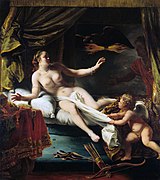Aegina (mythology)
| Greek deities series |
|---|
|
| Nymphs |
|
Aegina (/iˈdʒaɪnə/; Ancient Greek: Αἴγινα) was a figure of Greek mythology, the nymph of the island that bears her name, Aegina, lying in the Saronic Gulf between Attica and the Peloponnesos. The archaic Temple of Aphaea, the "Invisible Goddess", on the island was later subsumed by the cult of Athena. Aphaia (Ἀφαῖα) may be read as an attribute of Aegina that provides an epithet, or as a doublet of the goddess.
Family
Though the name Aegina betokens a goat-nymph,[1] such as was Cretan Amalthea, she was given a mainland identity as the daughter of the river-god Asopus and the nymph Metope;[2] of their twelve or twenty daughters, many were ravished by Apollo or Zeus. Aegina bore at least two children: Menoetius by Actor, and Aeacus by Zeus, both of whom became kings. A certain Damocrateia, who married Menoetius, was also called her daughter by Zeus.[3]
The mortal son Menoetius was king of Opus, and was counted among the Argonauts. His son was Patroclus, Achilles' first cousin once removed through their paternal family connection to Aegina, and his intimate companion.
The son made immortal, Aeacus, was the king of Aegina, and was known to have contributed help to Poseidon and Apollo in building the walls of Troy. Through him, Aegina was the great-grandmother of Achilles, who was son of Peleus, son of Aeacus.
In one account, Aegina was also called the mother of Sinope by Ares.[4] Otherwise, she was usually her sister; both were daughters of Asopus.[5]
Mythology
Abduction
According to Apollodorus and Pindar, Aegina was abducted by Zeus,[6] with Ovid adding that he did so in the form of a flame;[7] he then took her to an island near Attica,[8] then called Oenone,[9] henceforth known by her name. Aegina's father Asopus chased after them; his search took him to Corinth, where Sisyphus was king. Sisyphus, having chanced to see a great bird bearing a maiden away to a nearby island, informed Asopus. Though Asopus pursued them, Zeus threw down his thunderbolts sending Asopus back to his own waters. Aegina eventually gave birth to her son Aeacus, who became king of the island.
Myrmidons
When the city of Aegina was depopulated by a plague sent by Hera in jealous reprisal for Zeus's love of Aegina, the king Aeacus prayed to Zeus for the ants that were currently infesting an oak tree to morph into humans to repopulate his kingdom. Thus the myrmidons were created.
Gallery
-
 Aegina is waiting for the arrival of Zeus by Ferdinand Bol
Aegina is waiting for the arrival of Zeus by Ferdinand Bol -
 Aegina visited by Jupiter by Jean-Baptiste Greuze
Aegina visited by Jupiter by Jean-Baptiste Greuze -
 Jupiter and Aegina by Jan Goeree
Jupiter and Aegina by Jan Goeree -
 Jupiter and Aegina by Cornelis Bos
Jupiter and Aegina by Cornelis Bos
Notes
- ^ Compare Aegis, Aegeus, Aigai "place of goats", etc.
- ^ Bell, Robert E. (1991). Women of Classical Mythology: A Biographical Dictionary. ABC-CLIO. pp. 7–8. ISBN 9780874365818.
- ^ Pythaenetos, quoting the scholiast on Pindar, Olympian Odes 9.107
- ^ Scholia on Apollonius Rhodius, 2.946
- ^ Diodorus Siculus, 4.72.1 & 5
- ^ Apollodorus, 3.12.6; Pindar, Isthmian 8.16–24 (pp. 210–3), Nemean 8.6–7 (pp. 88, 89).
- ^ Gantz, p. 220; Ovid, Metamorphoses 6.113.
- ^ A mythic inversion, as Aegina simply was the nymph of the island, whose culture, continuous from an early date, long preceded the introduction of the Olympian gods. Ceramic fragments at Aegina attest to trade with Minoan Crete and with the Cyclades.
- ^ "Wine Island", thus not an indigenous name after all: the introduction of viticulture provides many mythemes for the Hellenes.
References
- Apollodorus, The Library with an English Translation by Sir James George Frazer, F.B.A., F.R.S. in 2 Volumes, Cambridge, MA, Harvard University Press; London, William Heinemann Ltd. 1921. ISBN 0-674-99135-4. Online version at the Perseus Digital Library. Greek text available from the same website.
- Bell, Robert E., Women of Classical Mythology: A Biographical Dictionary. ABC-Clio. 1991. ISBN 9780874365818, 0874365813.
- Diodorus Siculus, The Library of History translated by Charles Henry Oldfather. Twelve volumes. Loeb Classical Library. Cambridge, Massachusetts: Harvard University Press; London: William Heinemann, Ltd. 1989. Vol. 3. Books 4.59–8. Online version at Bill Thayer's Web Site
- Diodorus Siculus, Bibliotheca Historica. Vol 1-2. Immanel Bekker. Ludwig Dindorf. Friedrich Vogel. in aedibus B. G. Teubneri. Leipzig. 1888–1890. Greek text available at the Perseus Digital Library.
- Gantz, Timothy, Early Greek Myth: A Guide to Literary and Artistic Sources, Johns Hopkins University Press, 1996, Two volumes: ISBN 978-0-8018-5360-9 (Vol. 1), ISBN 978-0-8018-5362-3 (Vol. 2).
- Pindar, Nemean Odes. Isthmian Odes. Fragments, edited and translated by William H. Race, Loeb Classical Library No. 485, Cambridge, Massachusetts, Harvard University Press, 1997. ISBN 978-0-674-99534-5. Online version at Harvard University Press.
- Publius Ovidius Naso, Metamorphoses translated by Brookes More (1859-1942). Boston, Cornhill Publishing Co. 1922. Online version at the Perseus Digital Library.
- Publius Ovidius Naso, Metamorphoses. Hugo Magnus. Gotha (Germany). Friedr. Andr. Perthes. 1892. Latin text available at the Perseus Digital Library.
Further reading
- Robert Graves, The Greek Myths (1955) 1960, 66.b.1; 67.f; 138.b.
- Edith Hamilton, Mythology (1940) 1942 Mentor
External links

 Media related to Aegina (Oceanid) at Wikimedia Commons
Media related to Aegina (Oceanid) at Wikimedia Commons















